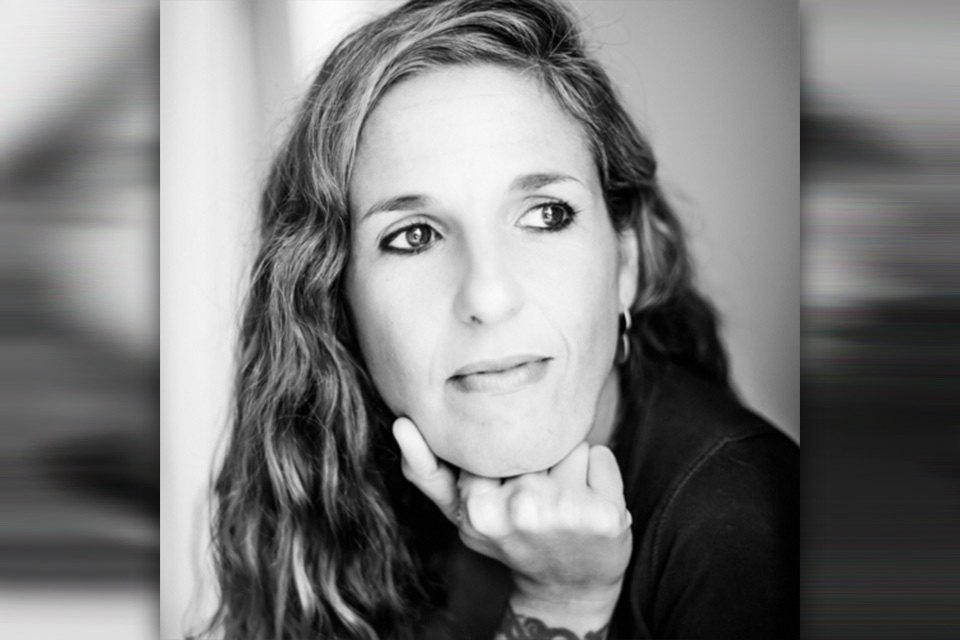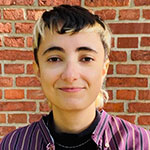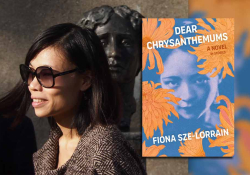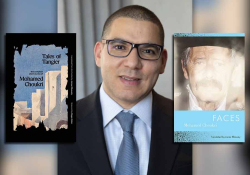Launching Books into the World: A Conversation with Carolina Orloff
 Carolina Orloff is a translator, author, and researcher of Latin American literature. In 2016, after obtaining her PhD from the University of Edinburgh, she set up Charco Press, where she serves as editorial director. For her work at Charco, Carolina was awarded Editor of the Year (Saltire Society, 2018), and for her work as co-translator of Die, My Love, by Ariana Harwicz, she was a finalist for the Man Booker International Prize (2018).
Carolina Orloff is a translator, author, and researcher of Latin American literature. In 2016, after obtaining her PhD from the University of Edinburgh, she set up Charco Press, where she serves as editorial director. For her work at Charco, Carolina was awarded Editor of the Year (Saltire Society, 2018), and for her work as co-translator of Die, My Love, by Ariana Harwicz, she was a finalist for the Man Booker International Prize (2018).
In the research project* “The Novel as Global Form. Poetic Challenges and Cross-border Literary Circulation” at the Universitat Oberta de Catalunya, we are studying a corpus of novels published in the last thirty years that go beyond the national and linguistic sphere and are projected onto the international literary market. Among the novels that interest us, the works of two authors, both from the Charco catalog, stand out: Ariana Harwicz, for her hybrid voice and her exploration of violence and motherhood, as well as her way of experimenting with form; and Gabriela Cabezón Cámara, for her rewriting of Martín Fierro, which interrelates aesthetic, linguistic, and queer elements. Both are authors, moreover, of works that have circulated very well beyond the Argentine publishing market.
Aitana Bellido: Since 2017, Charco Press has achieved national and international critical acclaim with authors such as Ariana Harwicz, Gabriela Cabezón Cámara, and Claudia Piñeiro being listed for the International Booker Prize. Charco has been a beacon that has projected a pool of emerging Spanish-speaking talent in the English-speaking world. What aspects of these authors do you think may have attracted the jury?
Carolina Orloff: At the moment [September 2023], our authors are being nominated for several prizes: the Queen Sofía Spanish Institute Prize, the Warwick Prize for Women in Translation, the Cercador Prize. . . . I think it has to do with a combination of factors and the way we do things at Charco Press. As for our editorial work, I would highlight two key elements: first, we check the translation carefully against the original. We started doing this instinctively, and then we realized that other publishers don't normally work like that. We always go back to the original to make sure that all possible nuances are there, and we check the translation itself, treating it as a self-contained unit. Perhaps this rigorousness has been recognized by the awards. The other factor is that we bet on all the prizes; I call this a “poetics of faith.” There are not many prizes for translated literature in the Anglo-Saxon world—more are appearing lately, but if we compare with the prizes that exist for books originally written in English, there are really few.
Bellido: Are there other factors that justify this acknowledgment and international circulation?
Orloff: I think there is a combination of idiosyncrasies and contexts of production that take place in Latin America. Also, there are many female authors that produce absolutely unique literature. This combination of particular contexts and universal themes gives rise to a product that people are interested in and questions us from a different perspective. The arrival of Charco has something to do with that, with the political, historical, and economic context of Latin America, which involves violence but also universal themes.
Bellido: In the academic context, the so-called global novel is understood as a cultural good that circulates, mostly in English, in the international publishing market, but also as an element with literary value that imposes itself in the face of market dynamics. How are the voices of Argentine and Latin American writers by extension, such as Ariana Harwicz, Claudia Piñeiro, and Gabriela Cabezón Cámara, received in the UK?
Orloff: Since 2019, Charco also distributes in the US and Canada, and since the pandemic, we actually have more readers there than in the UK. As an editor, I would say that Ariana has a very singular aesthetic search that is related to language. She finds a musicality that goes beyond language, in this case French, and that is what dominates her literature, her aesthetic project. The plot of Die, My Love is for me a mental explosion, an expression of that aesthetic search, and the challenge of transporting the English reader to the experimental journey of the novel, which goes through you like an electric shock.
Cabezón Cámara has a different journey, more baroque. Her intervention in language questions national myths and the historiography of Argentina. She examines who we are by questioning what we are told. I thought it would be interesting to propose this book to the Anglo-Saxon reader to see if they would understand it, because it was linked to a national narrative that does not “transcend.” I don’t believe in that; I believe that everything can be translated and transcend if one pushes from a particular place.
I believe that everything can be translated and transcended if one pushes from a particular place.
Claudia’s search is more grounded, not related to language. With Elena Knows, especially, she focuses on the gaze of an older person with Parkinson’s, someone who is never in the center of literary narratives, someone more on the margins. It is hard to unite the three authors, but thinking out loud with you I think there is a current between them that implies working with something (a search for language, a historical literary reformulation, a reformulation of marginalized characters) through literature.
Bellido: What has been the historical relationship between the UK and Argentina in terms of the importation of translated texts or, by extension, between the UK and Latin America? Do you think that the pool of writers who are currently representing otherness has come mainly from the former colonies of the British Empire?
Orloff: I’ve been living in the UK for the past twenty years. I sense that Latin America is a terra incognita in the imaginary of the British reader. They have more specific ties to other regions in the world due to their colonial history, and yet Latin America does not fit into the map of the British Empire. Charco’s biggest challenge is to dig a little into that skin that always goes to the same stories, the same contexts, the same imaginaries. To question that a little and generate a curiosity that is not innately there for the British reader.
This question (what is Latin-American literature?) is a great opportunity, and we are working on that big void. For decades, there was a repetition of stereotypes regarding what Latin American literature was. With Gabriel García Márquez, the Boom generation . . . it all stayed fixed and crystalized. Bolaño showed up briefly, but I think that the last decade is renovating this, with Samanta Schweblin and other authors who are creating more dynamic and varied things. As an editor, I am interested in that diversity of voices and aesthetic searches when it comes to building a catalog, precisely to go against the solidified preconception that Latin American literature is magical realism, drug lords, those rooted imaginaries.
Bellido: In the publishing sector, there is a certain inequality in the flow of editorial exchange between the so-called “central” and “peripheral” languages and countries. This means that the US only translates 3 percent, while it exports thousands of originals for translation to the rest of the world. What motivated you to publish novels by Latin American authors in a country like the UK? What changes have taken place in the UK publishing market since Charco opened its doors?
Orloff: I think there has been a change since Charco exists. I see this, too, as a citizen that has been living in the UK for twenty years and reads and goes to [literary] festivals. The new generation of readers are more open to the peripheries, and that is reflected on the consumption of translated literature, which I find very hopeful. I see this reflected in what publishing houses bet on. I’m always talking about independent publishing houses, both in the US and the UK. The ones that have the most to lose are always taking the greater risks.
Bellido: Is publishing Latin American texts in the UK and the US a political act?
Orloff: Yes, of course. And Charco’s existence is also a political act, at least that is how I see it. Publishing Latin American literature in English and Spanish in the US and in the UK is, from my end, a political act of resistance, a cry for diversity and decolonization, and for coexistence with difference, without a doubt.
Publishing Latin American literature in English and Spanish in the US and in the UK is, from my end, a political act of resistance.
Bellido: UNESCO has championed diversity in the publishing and cultural sector with the 2005 Convention on the Protection and Promotion of the Diversity of Cultural Expressions. At the institutional level, reference is also made to “bibliodiversity.” At Charco Press, do you consider the defense and promotion of cultural diversity? What role do independent publishers play in this regard?
Orloff: Yes, we are very interested in this, and we always have this on our radar in the difficulties of the Latin American context. When a voice is considered or published, diversity has been taken into account. Charco’s advantage is that I’m bilingual and I come from a Latin American context, so I don’t have to wait until a novel wins prizes in Latin America or Spain, or until it is a success, or until I receive reports from agents or translators. I cling to that advantage, it is an opportunity. I try to read as diversely as possible and not wait until the Latin American literary industry, which is not fair at all, produces a book for me to consider. I try to go beyond to dismantle the imposed structure and focus on bibliodiversity and voices that, for reasons beyond their literary quality, maybe don’t get published.
I try to go beyond to dismantle the imposed structure and focus on bibliodiversity and voices that, for reasons beyond their literary quality, maybe don’t get published.
Bellido: What differences do you find between the mechanisms (prizes, reception, translations) that consecrate an author in the Hispanic world and the Anglo-Saxon world?
Orloff: I work from a very specific place, translated literature. Charco’s work is different from the work of other publishing houses that only publish English literature. I think the Hispanic world is changing. Until ten years ago, the focus was always on Spain. If a book from Chile, Colombia, México . . . “arrived” to Spain or won a prize in Spain, it was a measure of its success. It had to “arrive” somewhere, as if being published in Latin America was not an end on its own. I think this is definitely changing, and publishers from Latin America have told me that: it is no longer the canon that a Spanish prize or publishing house dictates. It is, perhaps, being listed for the Booker, or being published by an independent publishing house that is prestigious, like Sexto Piso in México, for instance.
There is an inter–Latin American gaze that did not exist five years ago.
There is, finally, an inter–Latin American gaze that did not exist five years ago. Of course, this is also coming from other obstacles, moving the books is hard: they don’t arrive, if they do they are expensive . . . And interreading becomes difficult. But this is changing. There are distribution proposals that are more dynamic and synchronized with the reader’s interests. And this takes us to the question: is there a global gaze? We have a different gaze from the one we had in the 1990s. It is a gaze that is starting to deviate from the most classic canon dictated from Spain or the US. It is more diverse, more democratic, more fluid. And waiting to see what works in English first rather than in Spanish is quite new.
Bellido: In an interview at the White Review, Ariana Harwicz stated that her migrant status in France “also translates into my writing, because my writing arises from this feeling of foreignness.” As her co-translator into English, would you say that there are distinct linguistic or cultural elements in the language Harwicz uses? Is Ariana Harwicz an Argentine writer? In her case, did you work more as a translator or as a cultural mediator?
Orloff: Without a doubt, there is an extranjería, a “foreignness,” that traverses her and her language. She mentions that the influence from French traverses that Buenos Aires Castilian matrix, more Argentine. I don’t have the level of French to perceive that, but I do perceive something disrupted in her language. And this disruption compelled me very closely, because I am from the same generation. Maybe there is something that I can understand being a Spanish speaker, which you would understand, something that can be sensed in the mother tongue and can be difficult to perceive in another language. It’s not something specific, it’s something that comes from the sound, or the syntax, or the vertiginous rhythm of Ariana. It is there, in a paused reading, and you can see that is not how things are said, that is not how we speak, but its musicality fits perfectly.
As a translator, one sometimes tend to correct those things. I worked on that with Sarah [Moses], and then with Annie [McDermott]. In Sarah’s case, I intervened on the first English translation to go deeper and try to achieve a language more disrupted and traversed by other sounds, something very particular from Harwicz’s literature. I mentioned that we belong to the same generation because there were smells or metaphors. . . . I remember a specific smell from bike shops, which no longer exist in Argentina, shops where you could go and rent a bike for half an hour, something very specific from the 1980s. And even though Sarah had lived in Argentina, she was younger and had not lived that “olfactory image.” Without a doubt, I consider myself a co-translator at that level: I intervene a lot in the language, and I look for alternatives that can replicate that rich complexity of Harwicz’s language.
I was a cultural mediator, too, but I am in all of the books; it is part of Charco’s mission, and a political decision, too: not only do we launch books into the world, we become also their companions, we organize interviews, opinion articles, and facilitate that those voices can be heard. I am very interested in finding a space for them in the Anglo-Saxon world, and it is not easy.
Bellido: Writers from the Boom generation also migrated to Europe. Would you say that their ideas and their discourse differ from the ones of other writers like Ariana Harwicz or Gabriela Cabezón?
Orloff: Boom writers and these new authors share an aesthetic search, a very strong and vital impulse to renovate language, to play with it, to stir it. Politically, there were many authors during the Boom generation, most of them men, with a very strong ideological commitment to the movements and fights of Latin America; this was an intellectual commitment. Today’s political commitments are less defined. They exist, and they are strong, but literary works nowadays answer to a very personal and aesthetic pulsion, and less to an ideological or regional one.
October 2023
*(Spanish Research Agency, PID2020-118610GA-I00), led by Neus Rotger and Marta Puxan-Oliva.
Editorial note: Aitana Bellido would like to thank Diana Roig-Sanz for her assistance with questions for this interview. You can read Bellido’s interview of Leonora Djament, editorial director of Eterna Cadencia Editora, here.















